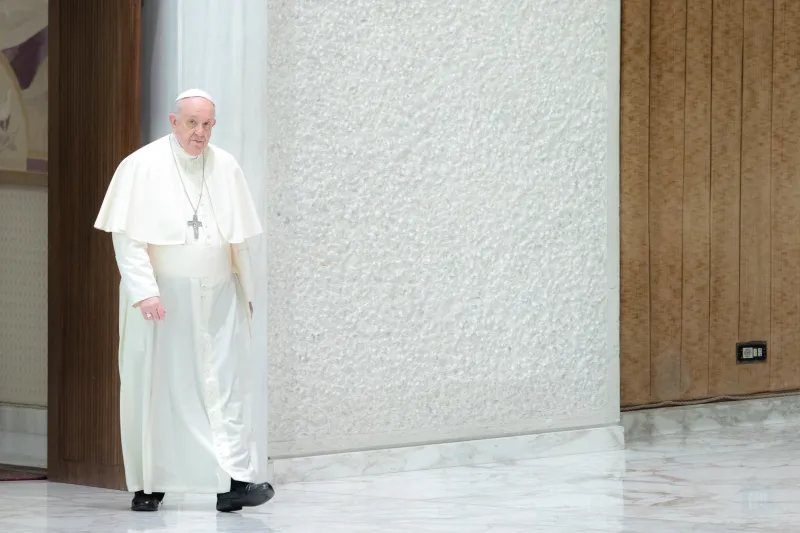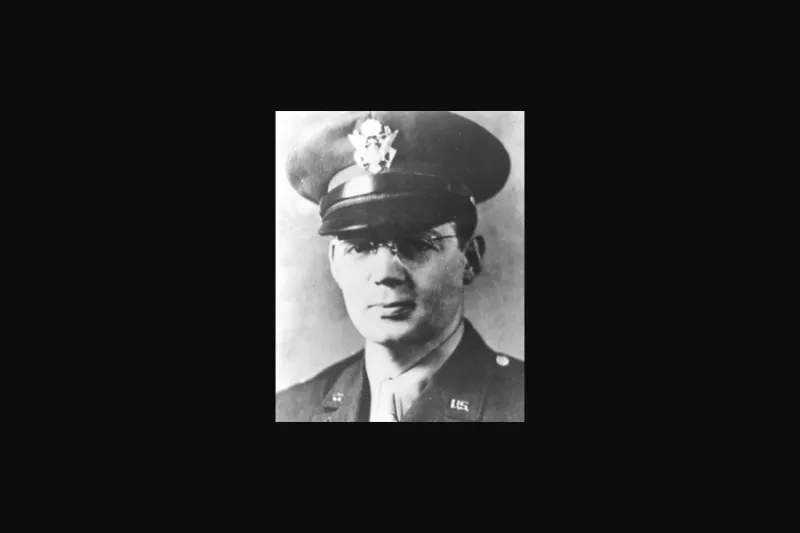 Pope Francis at the General Audience in the Vatican’s Paul VI Hall, Feb. 2, 2022. / Daniel Ibañez/CNA
Pope Francis at the General Audience in the Vatican’s Paul VI Hall, Feb. 2, 2022. / Daniel Ibañez/CNA
Denver Newsroom, Feb 3, 2022 / 17:20 pm (CNA).
Any talk about apostates and former Catholics who persecute the Church is bound to grab attention, and Pope Francis’ Wednesday audience drew a reaction from some who wondered whether he had intentionally included the damned in the communion of saints.
For all the controversy, the pope’s comments seem to reflect his personal emphasis on Catholic Christians’ links to the saints in heaven, but also to our loved ones and neighbors who are baptized but currently reject the faith.
“We are brothers. This is the communion of saints. The communion of saints holds together the community of believers on earth and in heaven, and on earth the saints, the sinners, all,” the pope said during his Feb. 2 general audience. During his catechesis, he emphasized that reliance on the intercession of a saint “only has value in relation to Christ.”
“Christ is the bond that unites us to him and to each other, and which has a specific name: this bond that unites us all, between ourselves and us with Christ, it is the ‘communion of saints’,” said the pope.
He cited the Catechism of the Catholic Church, which defines the communion of saints as “the Church.”
“What does this mean? That the Church is reserved for the perfect? No,” the pope added. “It means that it is the community of saved sinners.”
“No one can exclude themselves from the Church, we are all saved sinners. Our holiness is the fruit of God’s love manifested in Christ, who sanctifies us by loving us in our misery and saving us from it. Thanks always to him we form one single body, says St Paul, in which Jesus is the head and we are the members,” he said.
The image of the Church as the Body of Christ helps us understand what it means to be bound to one another in communion, the pontiff continued. This body can suffer together, or be glorified together.
Summarizing St. Paul, Pope Francis said: “we are all one body, all united through faith, through baptism… All in communion: united in communion with Jesus Christ. And this is the communion of saints.”
The joy and sorrow of each Christian’s life affects every other Christian, said the pope, and this has consequences for how Christians respond to each other.
“I cannot be indifferent to others, because we are all in one body, in communion,” he explained. “In this sense, even the sin of an individual person always affects everyone, and the love of each individual person affects everyone.”
By virtue of the communion of the saints, every Christian is bound to another in “a profound way,” he said, adding “this bond is so strong that it cannot be broken even by death.”
The communion of saints includes the dead, said the Pope.
“They too are in communion with us,” he said. “Let us consider, dear brothers and sisters, that in Christ no one can ever truly separate us from those we love because the bond is an existential bond, a strong bond that is in our very nature; only the manner of being together with one another then changes, but nothing and no one can break this bond.”
Pope Francis then raised an objection from a hypothetical speaker: “let’s think about those who have denied the faith, who are apostates, who are the persecutors of the Church, who have denied their baptism: Are these also at home?”
The pope responded: “Yes, these too. All of them. The blasphemers, all of them. We are brothers. This is the communion of saints. The communion of saints holds together the community of believers on earth and in heaven, and on earth: the saints, the sinners, all.”
“In this sense, the relationship of friendship that I can build with a brother or sister beside me, I can also establish with a brother or sister in heaven,” he said, continuing to explain devotion to the saints.
The pope’s remarks about apostates, persecutors, and those who deny their baptism drew some reaction on the internet.
CNA sought comment from Father Roch Kereszty, a Cistercian monk and retired University of Dallas theology professor. He said that papal talks are in the genre of “a fatherly exhortation, not a binding document” and must always be interpreted in a Catholic context.
“Most of Wednesday’s talk is a beautiful meditation on the communion of the saints in which Pope Francis emphasizes so enthusiastically the baptismal bond’s strength that some of his statements can easily be misunderstood,” Kereszty said Feb. 3. “Aware of his many attestations that he is a son of the Church and teaches only what the Church teaches, I exclude an intention to contradict the Church’s faith.”
“Baptism imprints an indelible mark on the soul, called baptismal character, and if there is no opposition by the soul, it also results in sanctifying grace in virtue of which Christ lives in the soul and joins us to himself and to all Christians both on earth and heaven,” he continued. “By grave, mortal sin we lose sanctifying grace and thus the indwelling of Christ in the soul and, of course, the right to heaven. But no sinner, no matter how obstinate, can lose the indelible mark of the baptismal character.”
“Every mortal sin breaks the bond of love on the part of the sinner, but it does not delete the character,” Kereszty said.
“The Pope quoted the Catechism: ‘The communion of the saints is the Church.’ Yes, but the living members of the Church are those in a state of sanctifying grace,” the priest added. “Those baptized members in a state of mortal sin are dead members, but the prayers of the Church are surrounding them with the love of a grieving mother. They will be saved only if they repent.”
“So it seems that when the pope speaks of the baptismal bond he does not distinguish between the character of baptism which one cannot lose, but which does not in itself save, and the bond of love which saves because it assures Christ’s presence in the soul,” Kereszty explained. “But this bond of love is destroyed by mortal sin on the part of the sinner. The Church, by her prayers, however, tries to obtain the grace of repentance for the sinner. And the baptismal character in the sinner may work in his heart to obtain his conversion.”
Asked about baptism and hell, Kereszty said, “the Communion of Saints and the baptismal bond does not include those in hell. One should speak about hell, but not necessarily in the same talk.”
Pope Francis does not particularly focus on hell in his preaching, but he has referred to hell and God’s judgement in the past.
In Nov. 22, 2016 remarks during a morning meditation at his residence the Casa Santa Marta, he reminded his audience of “(the) call from the Lord to think seriously about the end: about my end, the judgement, about my judgement.”
The pope remarked that children traditionally learn the “four last things” from the Catechism, namely “death, judgement, hell or glory.”
While some might say “Father, this frightens us,” Pope Francis said, he answered: “It is the truth. Because if you do not take care of your heart… (and) you always live far away from the Lord, perhaps there is the danger, the danger of continuing in this way, far away from the Lord for eternity. This is very bad!”
“Today it will be good for us to think about this: what will my end be like? How will it be when I find myself before the Lord?” the pope said.
He recounted Christ’s words from the Book of Revelation: “Be thou faithful unto death… and I will give you the crown of life.”
“Fidelity to the Lord: this does not disappoint,” he said in 2016. “If each one of us is faithful to the Lord, when our death comes, as shall we say what St. Francis said: ‘Sister death, come’. It will not frighten us.”
[…]







